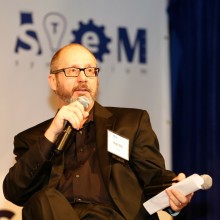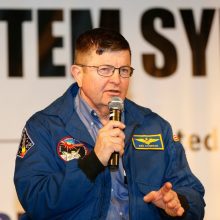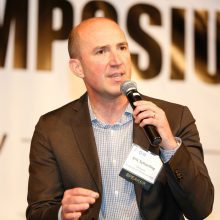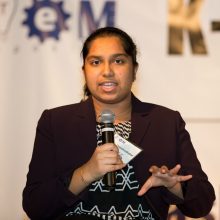
The 2015 K-12 STEM Symposium concluded Saturday, March 7, with a panel discussion on “Positive Messaging: Making STEM Cool for K-12 Kids,” featuring Kenneth Cameron, a former astronaut and current SAIC Vice President and Manager of the Risk & Reliability Solutions Division and NASA Johnson Space Center Safety & Mission Assurance Support Services Contract Program Manager; Eric Schierling, a former F18 Top Gun pilot and current Director of Vencore’s Space Group; and Pooja Chandrashekar, Thomas Jefferson High School for Science and Technology (TJHSST) senior and ProjectCSGirls founder. The panel was moderated by Rob Zitz, Leidos Senior Vice President and Chief Systems Architect.

Cameron portrayed to the audience the mission we are all on and how we are all playing a part of our future.
“Even as we sit here on Earth, we’re actually not standing still,” Cameron said. “We’re traveling 1,000 mph to the east because of the world’s rotation.
“Put yourself in the point of view of the astronaut. … How things work and being curious is the key to understanding how the space ship works and how you can make it better,” Cameron said. “We are all astronauts, we just have different size space ships.”
For Schierling, it was the time he spent with his grandfather in his machine shop during the summer that piqued his interest in STEM.
“Although,” he joked, “I think my parents were just looking to get their high-energy kid out of the house.”

“Whether it’s build a bridge or solve a disease that we as a society are able to solve, I walked away with a clear understanding that it provided me a confidence that I could go forth and pursue a position as a pilot,” Schierling said. “It’s that type of confidence that I would like my children to have going forward.”
The youngest of the trio was Chandrashekar. “It was really shocking to me being one of three girls in my AP Computer Science class,” she said. “That fueled my interest to encourage girls in computer science.”

Chandrashekar founded ProjectCSGirls, a national non-profit looking to close the tech gender gap starting at the middle school level. Studies have shown that the period when girls start to turn away from computing is a result from stereotypes they experience in middle school.
The panelists agreed that it was their efforts of being persistent that got them to where they are today.
“Today in the job market, it’s very difficult and many people have given up. It is the persistent ones that really succeed,” Cameron said. “If you think about Thomas Edison trying to invent a lightbulb — 10,000 didn’t work. As a scientist, failures are a good experiment. I don’t find that not being successful is the same thing as failure.
“Failure is a part of the learning process,” Schierling said. “Unfortunately, failure becomes a fear that too many of us use as an excuse to not try or to ask why not. It’s the curiosity and who has a better imagination than the youth in the room today.”
Click here to watch the panel discussion in its entirety.
The 2015 K-12 STEM Symposium is possible from the support of many local organizations, including Presenting Sponsor Leidos, Platinum Sponsor Vencore and Venue Sponsor The Nysmith School.


